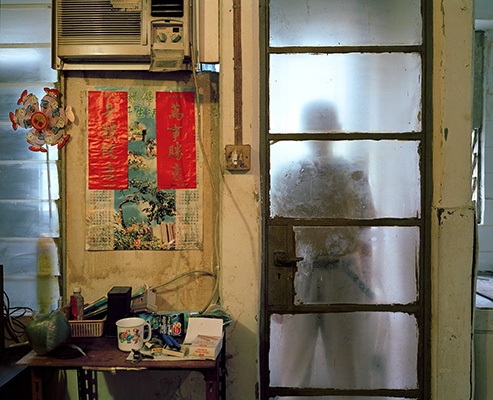
The world according to Kwang-sheung Chan Kwang-sheung
It’s a rainy day, a social worker and I take our umbrellas and head to Tai Kok Tsui. We knock and open the door to a psychiatric rehabilitation home where Kwang-sheung is sitting quietly on a couch. We are immediately surrounded by a group of patients who are curious about us and a member of staff who scans us from head to toe.
After answering a series of questions from the staff member, we take Kwang-sheung to the cha chaan teng downstairs and order him his favorite dish of noodles with luncheon meat and egg, plus a glass of cold tea. He talks about his past work and life, so it takes a while to finish the noodles.
He has suffered from schizophrenia since he was a child. In primary school, he couldn't keep up with the class and dropped out at a very young age. He lived with his elder brother on the So Uk Estate for the first half of his life. In the early days, he helped his elder brother sell second-hand watches at a stall in Aplui Street.
Most of the people living in the rehabilitation home have a mental illness but everybody is very friendly. Many of the residents are very lively and quick-witted. A chubby guy tells us that during the World Cup in Brazil, “I snuck out to Olympian City and watched the World Cup with a lot of people. After the game, I just snuck back.”
The rules of the home appear to be effective only against those who do not know how to fight for themselves. The staff member says Kwang-sheung “likes” sitting on the couch in the main room. When we go into the room, it is crammed with more than a dozen beds, the air conditioning has been broken for ages, and the sofa is wedged into a very dark and oppressively hot corner. The staff member usually does not allow Kwang-sheung to go out so he spends his days on this couch. (Spacing)
Kwang-sheung says he only has one friend at the home and his name is Frog. “I always talk to him but he never responds, never a word. I consider him my brother.” Frog is a real person falling asleep on the bed next to the sofa. Frog, indeed, does not speak at all. And yet Frog is the only person Kwang-sheung has chosen as his friend.
Everyone here has their own story to tell and a painful past. Many people here want a listener. This is how lonely they are. They are in the same space but it is as if they are alone. At that moment, another member of staff comes over with a broom. After looking us over, she turns and leaves. The floor is clean and spotless, just like Kwang-sheung.
It’s a rainy day, a social worker and I take our umbrellas and head to Tai Kok Tsui. We knock and open the door to a psychiatric rehabilitation home where Kwang-sheung is sitting quietly on a couch. We are immediately surrounded by a group of patients who are curious about us and a member of staff who scans us from head to toe.
After answering a series of questions from the staff member, we take Kwang-sheung to the cha chaan teng downstairs and order him his favorite dish of noodles with luncheon meat and egg, plus a glass of cold tea. He talks about his past work and life, so it takes a while to finish the noodles.
He has suffered from schizophrenia since he was a child. In primary school, he couldn't keep up with the class and dropped out at a very young age. He lived with his elder brother on the So Uk Estate for the first half of his life. In the early days, he helped his elder brother sell second-hand watches at a stall in Aplui Street.
Most of the people living in the rehabilitation home have a mental illness but everybody is very friendly. Many of the residents are very lively and quick-witted. A chubby guy tells us that during the World Cup in Brazil, “I snuck out to Olympian City and watched the World Cup with a lot of people. After the game, I just snuck back.”
The rules of the home appear to be effective only against those who do not know how to fight for themselves. The staff member says Kwang-sheung “likes” sitting on the couch in the main room. When we go into the room, it is crammed with more than a dozen beds, the air conditioning has been broken for ages, and the sofa is wedged into a very dark and oppressively hot corner. The staff member usually does not allow Kwang-sheung to go out so he spends his days on this couch. (Spacing)
Kwang-sheung says he only has one friend at the home and his name is Frog. “I always talk to him but he never responds, never a word. I consider him my brother.” Frog is a real person falling asleep on the bed next to the sofa. Frog, indeed, does not speak at all. And yet Frog is the only person Kwang-sheung has chosen as his friend.
Everyone here has their own story to tell and a painful past. Many people here want a listener. This is how lonely they are. They are in the same space but it is as if they are alone. At that moment, another member of staff comes over with a broom. After looking us over, she turns and leaves. The floor is clean and spotless, just like Kwang-sheung.
烱常的世界 陳烱常
我和社工打著雨傘走入大角咀,敲開精神復康院舍的大門,烱常靜靜坐在沙發上,身邊圍繞著十多名湊熱鬧的院友,還有不停上下打量我們這些來訪者的職員「阿姐」。
我們被阿姐一輪盤問過後,帶烱常到在院舍樓下的茶餐廳吃他喜歡的餐蛋面,喝凍奶茶。烱常其實很多話,餐蛋面吃了好久沒吃完,談他以前的工作及生活。烱常自小患精神分裂症,讀書讀到小學就跟不上進度,不能再讀下去。上半生,他一直跟著哥哥生活,住在蘇屋邨。少年的烱常,跟著哥哥在鴨寮街擺攤檔賣舊錶,賣的是精工、星辰。
烱常住的院舍裏,住客雖然大部份是精神病人,但他們都很友善沒有攻擊性,許多人還很活潑伶俐。有個胖子院友就說,巴西世界盃期間,「我偷偷跑出去奧海城,跟好多人看世界盃,然後又偷偷回來」。顯然,某些設防不能限制這些活躍的人,卻很有效地限制著不懂爭取的老實人。阿姐說,烱常最「喜歡」坐在大房間裡面的沙發上。我們走進去房間,裡面有十幾個床位,空調長期壞掉,沙發的位置很暗,熱,熱得出油不出汗那種悶熱。阿姐平時不准烱常落街,他的日子,就如此坐在這裡度過。
烱常說在這裡只有一個朋友,名叫「青蛙」,是烱常幫他改的名字。你們平時都聊些什麼?烱常說:「我一直跟他說話,但他從來沒有回答過我,也沒有說過一句話。我當他是弟弟。」「青蛙」就睡在沙發旁邊的床上。青蛙,確是不說話。烱常在群體的生活裡,只選擇了青蛙當自己的朋友,其他人都不認識,不會交談。
院舍裡每個人都有其故事,都有不堪回首的過去。這是多麼的孤獨,他們明明是集體生活,但形同一個人住。談著,一名阿姐又拿著掃把進來,視察了我們的交流後,然後才轉身離開。那塊地板,是乾淨無垢,就像老實的烱常。
返回相片
我和社工打著雨傘走入大角咀,敲開精神復康院舍的大門,烱常靜靜坐在沙發上,身邊圍繞著十多名湊熱鬧的院友,還有不停上下打量我們這些來訪者的職員「阿姐」。
我們被阿姐一輪盤問過後,帶烱常到在院舍樓下的茶餐廳吃他喜歡的餐蛋面,喝凍奶茶。烱常其實很多話,餐蛋面吃了好久沒吃完,談他以前的工作及生活。烱常自小患精神分裂症,讀書讀到小學就跟不上進度,不能再讀下去。上半生,他一直跟著哥哥生活,住在蘇屋邨。少年的烱常,跟著哥哥在鴨寮街擺攤檔賣舊錶,賣的是精工、星辰。
烱常住的院舍裏,住客雖然大部份是精神病人,但他們都很友善沒有攻擊性,許多人還很活潑伶俐。有個胖子院友就說,巴西世界盃期間,「我偷偷跑出去奧海城,跟好多人看世界盃,然後又偷偷回來」。顯然,某些設防不能限制這些活躍的人,卻很有效地限制著不懂爭取的老實人。阿姐說,烱常最「喜歡」坐在大房間裡面的沙發上。我們走進去房間,裡面有十幾個床位,空調長期壞掉,沙發的位置很暗,熱,熱得出油不出汗那種悶熱。阿姐平時不准烱常落街,他的日子,就如此坐在這裡度過。
烱常說在這裡只有一個朋友,名叫「青蛙」,是烱常幫他改的名字。你們平時都聊些什麼?烱常說:「我一直跟他說話,但他從來沒有回答過我,也沒有說過一句話。我當他是弟弟。」「青蛙」就睡在沙發旁邊的床上。青蛙,確是不說話。烱常在群體的生活裡,只選擇了青蛙當自己的朋友,其他人都不認識,不會交談。
院舍裡每個人都有其故事,都有不堪回首的過去。這是多麼的孤獨,他們明明是集體生活,但形同一個人住。談著,一名阿姐又拿著掃把進來,視察了我們的交流後,然後才轉身離開。那塊地板,是乾淨無垢,就像老實的烱常。